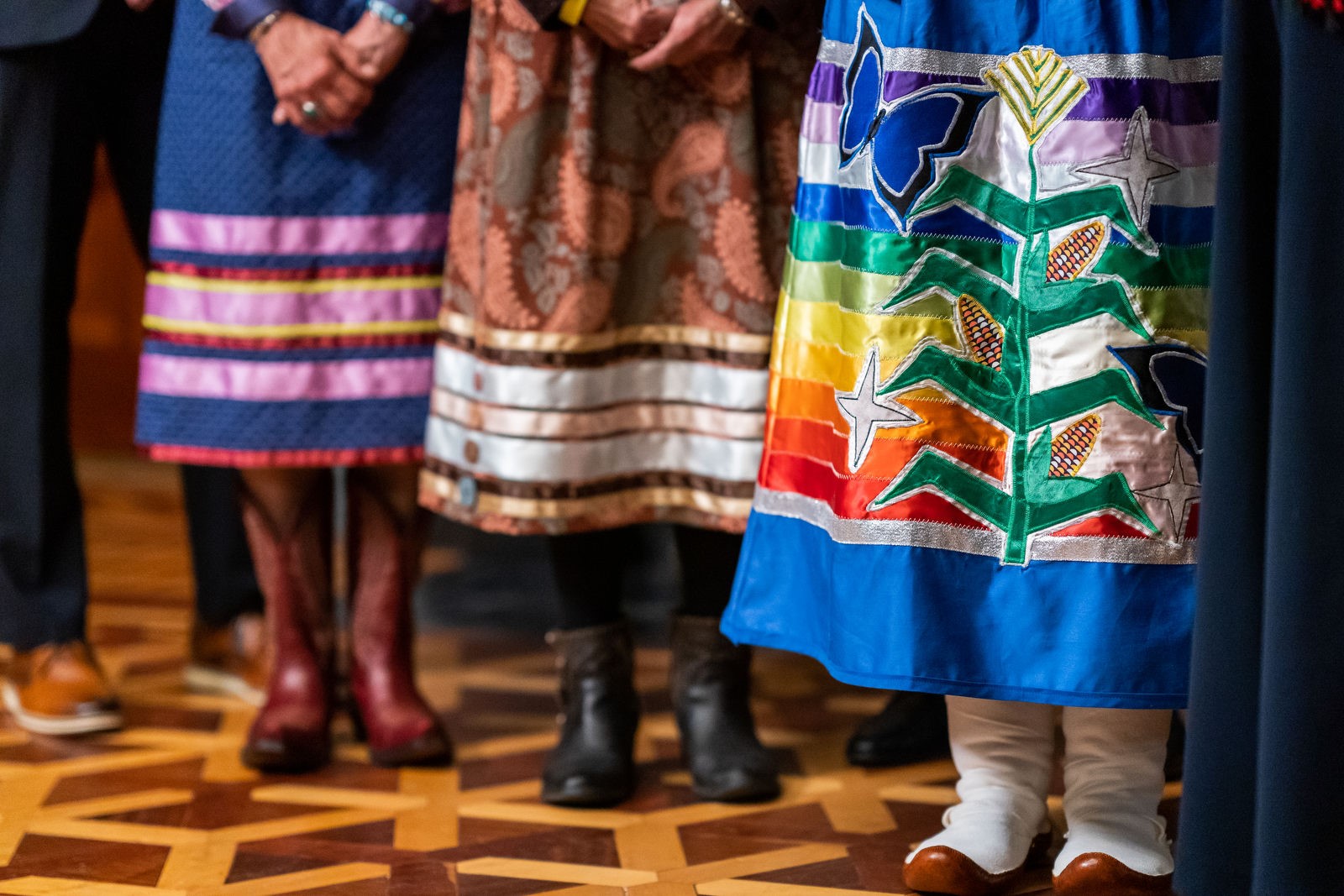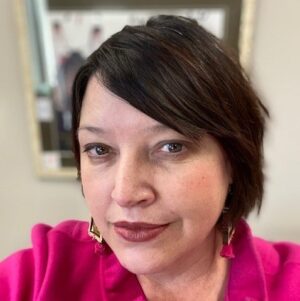Native American Heritage Month: Native American Leaders Shaping the Biden-Harris Administration
In honor of Native American Heritage Month this November, the Presidential Personnel Office asked Native American leaders across the Biden-Harris Administration to share how their life and professional experiences inform their public service today. We are proud to highlight the following political appointees, whose work serves the nation every day. Responses have been edited for clarity and length.

U.S. Department of the Interior

Danna Jackson, Senior Counselor to the Director of the Bureau of Land Management
1. Can you tell us about the mission of your office?
The Bureau of Land Management’s mission is to sustain the health, diversity, and productivity of public lands for the use and enjoyment of present and future generations.
2. How does your personal background inform your public service today?
I grew up on a ranch on the Confederated Salish and Kootenai Tribes of the Flathead Indian Reservation. My father was a long-time employee of the Tribes’ Division of Lands. I come from a long line of land stewards which is, to a large extent, why I had a specific interest to go to law school. I wanted to study the intersection between natural resources and Indian Law, and work in this field. I have been lucky to do so. Working at the Department of the Interior is like coming home – its mission and its function is a culmination of all the things I care about: water resources, land stewardship, conservation, and sustainable development of natural resources. These are complicated issues with diverse stakeholders, and my upbringing, education, and experiences as a lawyer put me in a position to put my best foot forward when serving the public.
3. What advice would you give to young Native Americans hoping to enter public service?
It is a wonderful thing to go home and work for your tribe, but we need Natives and those with Indian Country experiences in all aspects of the federal government. Given the political nature of the federal-tribal relationship, it is critical that Natives are willing to serve and advise federal decision makers. Federal leaders make determinations every day that impact the political integrity, the economic security, and the health and welfare of a tribe. Natives need to be positioned to guide these critical decisions.

Heidi Todacheene, Senior Advisor in the Office of the Secretary
1. Can you tell us about the mission of your office?
The Office of the Secretary at the Department of the Interior works to provide support for agency leadership to further protect and manage the nation’s natural resources and cultural heritage; provide scientific and other information about those resources; and honor trust responsibilities to American Indians, Alaska Natives, and affiliated Island Communities.
2. How does your personal background inform your public service today?
Growing up Navajo in a rural, conservative oil-field border town adjacent to my reservation taught me some hard lessons early in life. It forced me to learn how to live in two worlds with contradictory cultural norms, values, societal structures, and languages. The skills that I learned growing up in this environment are skills that I still utilize every day now that I live in Washington, D.C. My upbringing honed my ability to listen and empathize with people to inform my policy-making, and also understand what makes a real difference on the ground. It has also helped me create better solutions because when you can understand opposing views, you can find middle ground to build lasting results for everyone.
3. What advice would you give to young Native Americans hoping to enter public service?
If you give 100% in everything that you do, be confident in what you bring to the table professionally. Your unique experience growing up Indigenous in America has already laid a strong foundation for you to be a fierce advocate for the underrepresented. Regardless of what sector you find yourself in, it’s that hard-earned grit that will carry you forward in the difficult moments.

Joaquin Gallegos, Special Assistant to the Assistant Secretary for Indian Affairs
1. Can you tell us about the mission of your office?
The Office of the Assistant Secretary for Indian Affairs supports the Secretary of the Interior and Assistant Secretary for Indian Affairs to strengthen the nation-to-nation relationships between the United States and Tribal Nations, and fulfill the Department’s trust and treaty responsibilities to Tribal Nations and individual American Indians and Alaska Natives.
2. How does your personal background inform your public service today?
I am a citizen of the Jicarilla Apache Nation and also hail from the Pueblo of Santa Ana. Growing up in New Mexico, Colorado, and Montana, and working across other parts of Indian Country gave me first-hand rural and urban perspectives that enhance my understanding of the practical impacts of law and policy. From interior Alaska to the Badlands, I learned from folks who had similar family experiences as me, energizing my recognition of common-thread problems and contributions to form comprehensive answers that account for local priorities.
My prior service at the U.S. Court of Appeals for the Tenth Circuit and U.S. Senate Committee on Indian Affairs improved my understanding of how government works.
My grandfather was a WWII Japanese POW and Bataan Death March Survivor, and two of my uncles are Vietnam combat veterans. Because of them, I especially honor veterans and service members of the Armed Forces, and the sacrifices of their families for our liberty.
3. What advice would you give to young Native Americans hoping to enter public service?
While we confront challenges that are unique to Indian Country, it is critical for all young Native people to know that they are not alone because their families, Indian Country, and the nation value them. As American Indians and Alaska Natives come from a legacy of diplomacy and engagement with the United States, public service in all forms – from law, medicine, architecture, engineering, and more trades – strengthen the nation-to-nation relationships between the United States and Tribal Nations. The perseverance and talent of young Native people ultimately fortify them to thrive and advance future-focused solutions for Indian Country and beyond.
U.S. Department of Energy

Matt Dannenberg, Deputy Chief of Staff at the Office of Energy Efficiency and Renewable Energy
1. Can you tell us about the mission of your office?
The mission of the Office of Energy Efficiency and Renewable Energy is to accelerate the research, development, demonstration, and deployment of technologies and solutions to equitably move America to net-zero greenhouse gas emissions economy-wide by no later than 2050. We also strive to ensure that the clean energy economy benefits all Americans, through the creation of good-paying, union jobs for the American people – especially workers in coal and energy communities and those historically underserved by the energy system and overburdened by pollution.
Indian Country and our people are resilient. As we move towards the clean energy future, the government needs to ensure tribes are at the forefront of energy resiliency, so our people and environment can thrive.
2. How does your personal background inform your public service today?
When I was young, I did not grow up around my culture. Through my career as a community organizer, I was able to reconnect with my tribe, the Bad River Bad of Lake Superior Chippewa, working to encourage civic engagement and fight for natural resources protections with Wisconsin tribes. I have witnessed firsthand families shouldering the burden of rising energy costs and having to make tough choices between heating their homes or buying food for their families. We can and will do better.
3. What advice would you give to young Native Americans hoping to enter public service?
You matter. Your story matters. Use your voice for those who can’t. Ask for help. There is a community of fellow tribal members that want to support you, see you succeed, and see our communities thrive. We need more people who can share the perspective of our communities advocating and writing laws to pass a better world to this generation and future generations.
